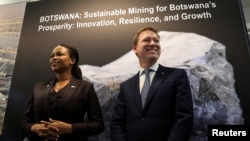The government of Botswana and South African diamond firm De Beers say they have reached a new, 10-year sales agreement following talks that had dragged on since 2019. Analysts say the diamond industry is sure to welcome the deal, as Botswana, after Russia, is the world’s second-largest producer of diamonds.
Under terms of the new agreement, Botswana’s government will be allowed to sell 30% of rough diamonds mined through a joint mining venture with De Beers.
The share rises to 50% by the end of the deal in 2035.
Botswana hopes that will reverse a decline in diamond revenue. The government once received $7 billion a year through De Beers, but that figure declined to $4.2 billion in 2023, amid falling diamond sales worldwide.
Addressing journalists on Monday, De Beers CEO Al Cook applauded the new government for ensuring a smooth conclusion to the talks.
Under the previous government, negotiations were often tense, with former President Mokgweetsi Masisi threatening to sever ties with De Beers.
The talks made more progress once President Duma Boko took over in November.
Elodie Daguzan, executive director at the World Diamond Council (WDC), told VOA the organization is happy to see the sides finally reach a deal.
"The World Diamond Council is thrilled about this development which underscores the importance of long-term, stable partnerships in the diamond sector. Botswana has been a leading example of how responsible diamond mining, through successful collaboration with the private sector, can drive sustainable growth," she said.
Daguzan said the agreement will bolster an industry beset by challenges that include consumer worries over so-called “blood diamonds” and overall cautious consumer spending.
"We believe it will provide much-needed confidence to members of our industry, who are currently navigating a particularly challenging market and seeking signs of stability. At WDC, we remain committed to supporting frameworks that ensure the ethical sourcing, transparency and the continued contribution of diamonds to the well-being of producing nations and communities," she said.
Hans Merket, a researcher on diamond mining, says it was imperative for Botswana and De Beers to reach an agreement, considering the global supply chain disruptions caused by sanctions on Russian diamonds.
"This agreement between the world’s largest diamond producer after Russia, will therefore be seen as a welcome development, not only to both parties but by the industry at large. Hopefully, it will enable the sector to continue advancing a more positive narrative with diamonds contributing to development and well-being, offering a clear alternative to sanctioned stones from Russia," he said.
Botswana’s Minister of Minerals, Bogolo Kenewendo, said her government and De Beers will officially sign the agreement before the end of February.
At the end of the new agreement in 2035, there is an option for a five-year renewal.




